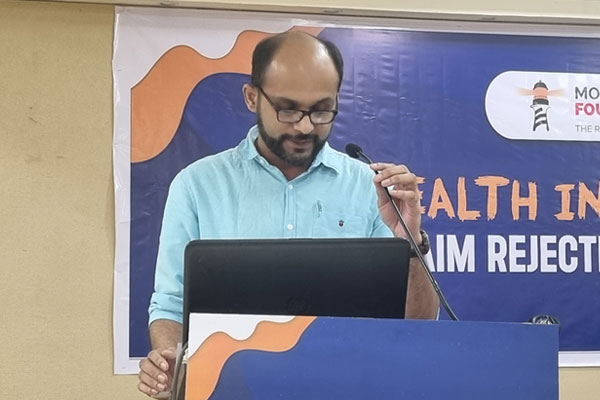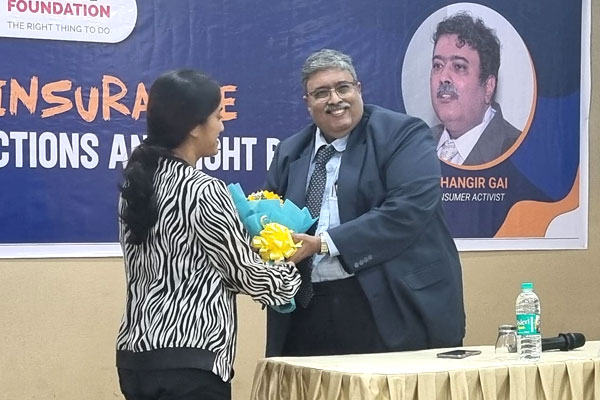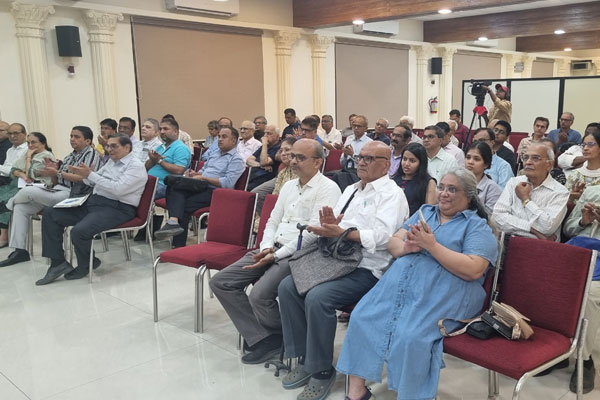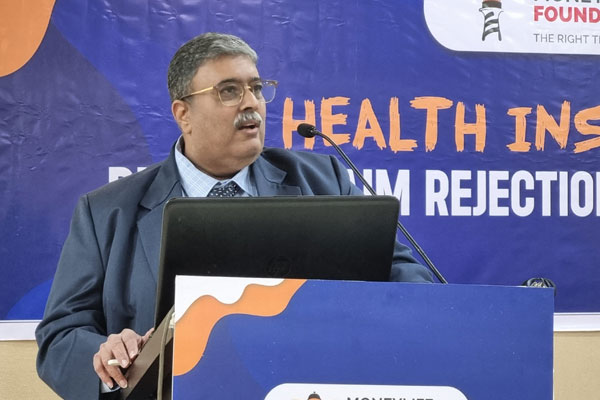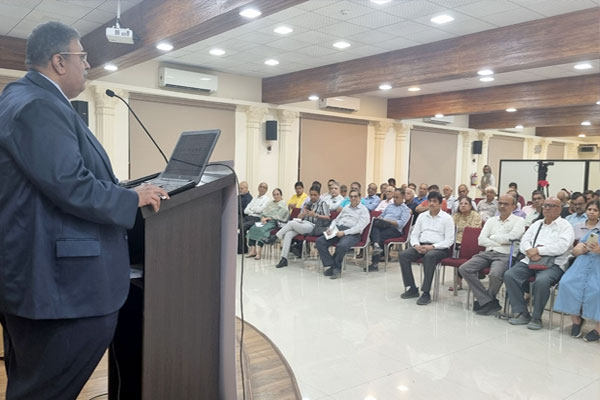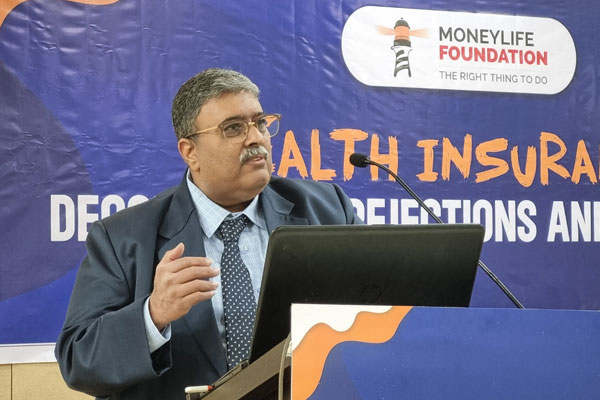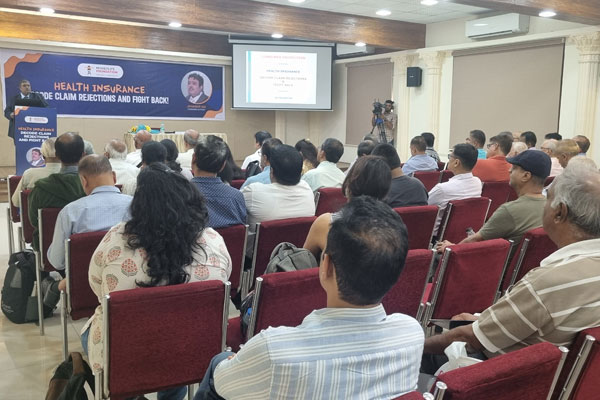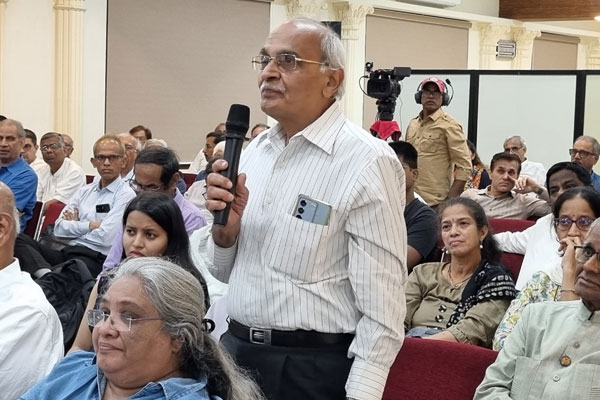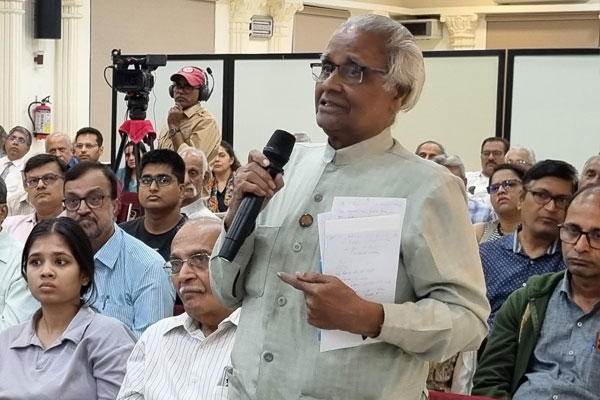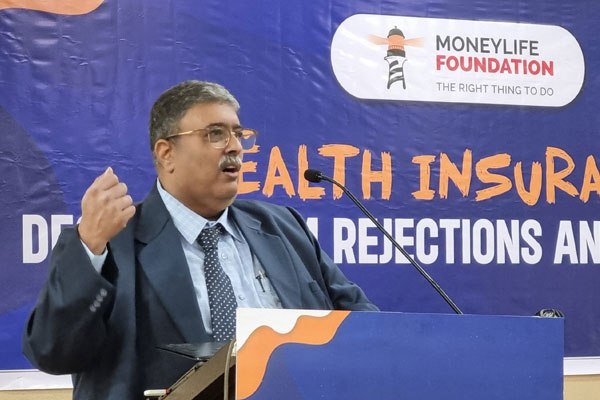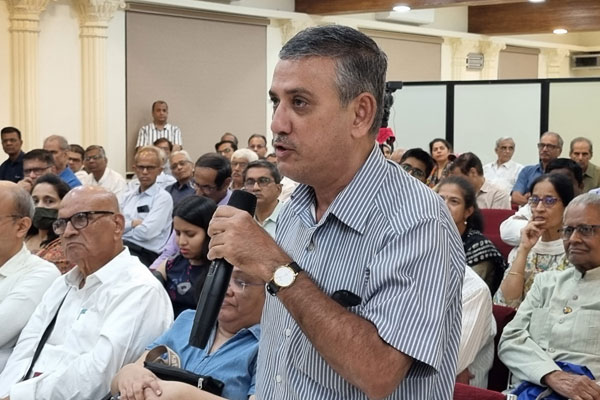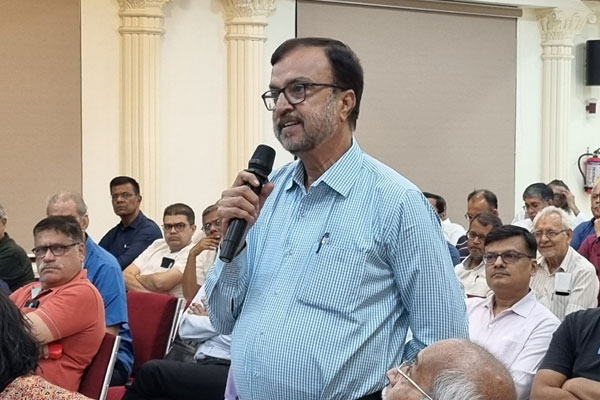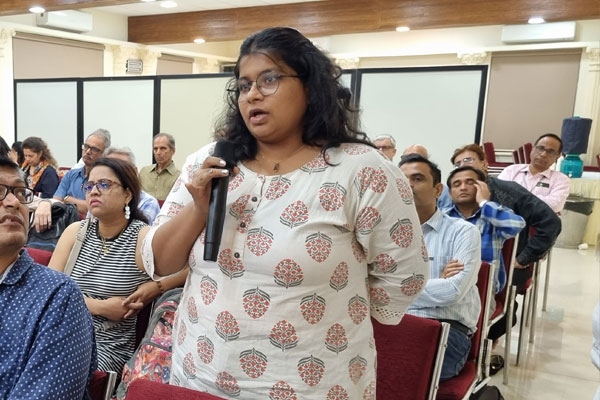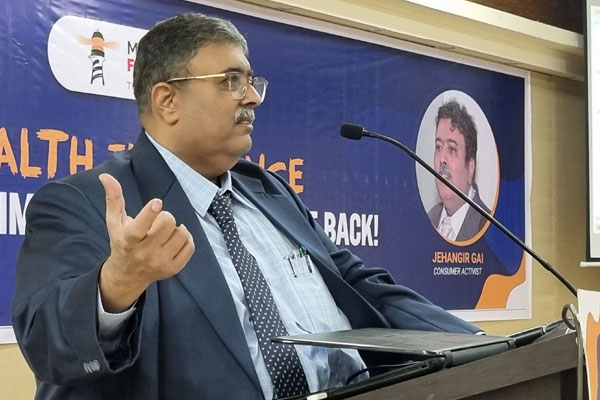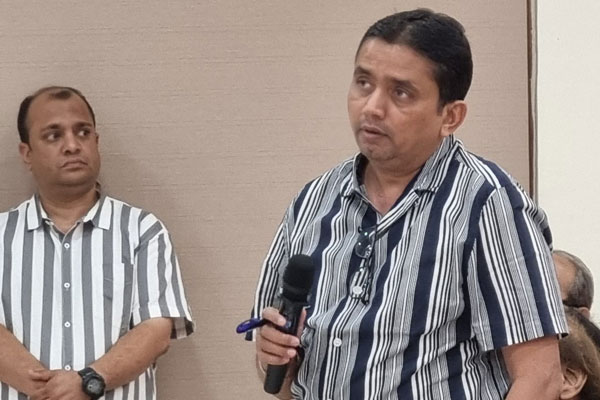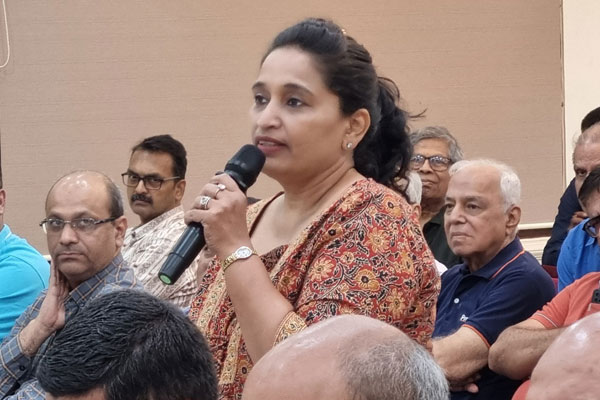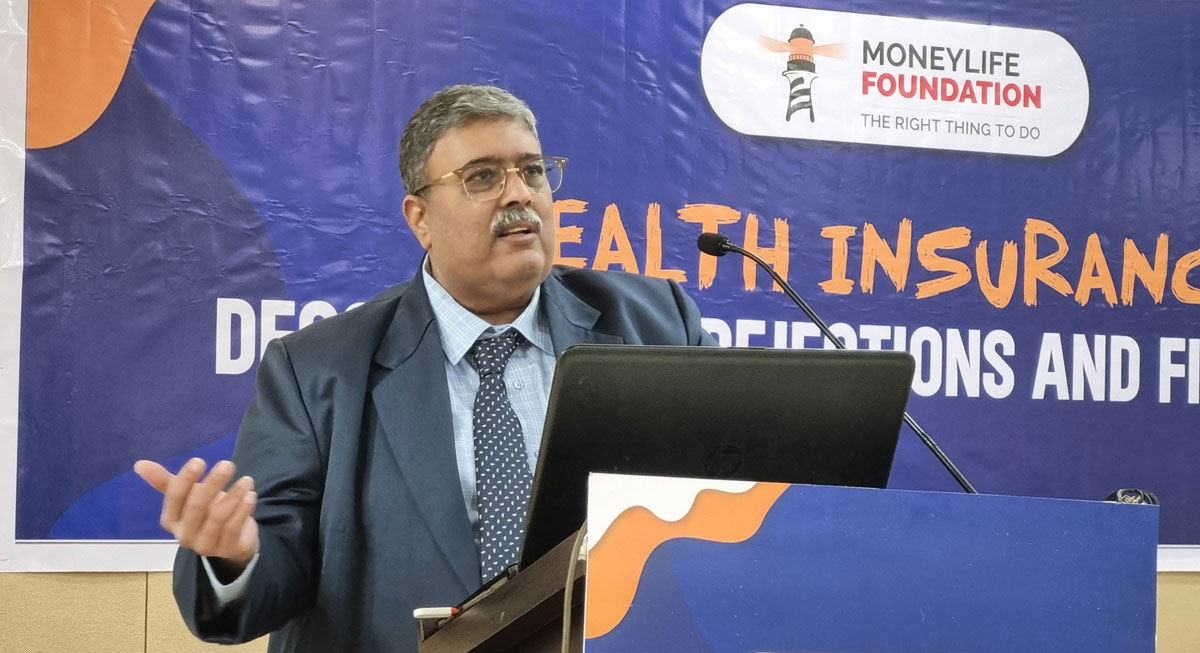
"The insurance policy terms cannot be changed at the whims and fancies of the insurance company," asserted consumer activist Jehangir Gai, delivering a powerful message at a programme organised by Moneylife Foundation, discussing the challenges a policyholder faces with health insurance claims.
Mr Gai, an eminent consumer rights advocate, captivated an attentive audience as he discussed the critical issues plaguing the insurance sector, the systemic hurdles policyholders encounter and the complex legal landscape that consumers must navigate, to claim their rightful dues. His talk was rich with real-world examples, legal insights and practical advice, making it an invaluable resource for attendees.
Throughout his talk, Mr Gai shed light on several unethical practices commonly adopted by insurance companies—from arbitrary claim rejections to the misuse of vague policy clauses and delays in processing claims. One of the most concerning practices he highlighted was the frequent invocation of the 'reasonability clause', where insurers unilaterally reduce claim amounts without adequate justification.
In one example, a policyholder's legitimate hospital bill was drastically slashed, underscoring how insurers often manipulate such clauses to avoid paying full claims. Mr Gai also pointed out that insurers frequently reject claims over minor delays in document submissions or trivial technicalities—issues that may not always be the policyholder's fault but are instead part of an inefficient system.
On the matter of changing policy terms, Mr Gai was unequivocal: "If the insurer wants to make any changes, they must obtain the policyholder's explicit consent. Unilateral changes are unacceptable."
He elaborated that once a policy is issued, it must be renewed under the original terms as long as the premium is paid on time. Drawing from legal precedents, he clarified that even claims related to genetic disorders—once deemed excluded—are now considered valid under public policy and must be honoured.
Mr Gai also pointed to a landmark Delhi High Court ruling in United India Insurance v/s Jay Prakash Tayal, which prohibited insurers from denying claims based on genetic conditions. This ruling, which declared such exclusions as contrary to public policy, is currently under review by the Supreme Court. Until the apex court issues its final verdict, the Delhi High Court's decision remains binding in Maharashtra and other states without conflicting rulings, he added.
Turning to the functioning of the insurance ombudsman system, the veteran consumer activist offered a balanced critique, recognising its potential as a speedy remedy while cautioning that bias sometimes affects ombudsman decisions, particularly when officials have ties to the insurance industry.
He shared a striking anecdote of four doctors whose identical claims were rejected by their insurer due to delays in processing by their association. Three doctors approached the insurance ombudsman and had their claims dismissed outright. However, the fourth doctor, represented by Mr Gai, was fortunate enough to face an ombudsman who, despite being openly antagonistic, eventually sanctioned 50% of the claim amount. Interestingly, when the remaining three doctors pursued their cases in consumer courts, they were awarded the full amount along with compensation and interest. This stark difference outcomes highlighted the inconsistent and often arbitrary nature of ombudsman rulings, Mr Gai says.
In another example, a woman undergoing surgery at a reputed hospital was shocked when her bill of Rs33,000 was reduced to just Rs10,000 by the insurer, citing a 'reasonability clause'. While the insurance ombudsman recognised the validity of her claim, they sanctioned only Rs30,000, leaving her still short-changed.
Mr Gai used these cases to underscore the reality that the ombudsman system can often feel like a 'lottery', where luck and who presides over the case matter more than fairness. He urged policyholders to approach the ombudsman as a first step but remain prepared to escalate their disputes to consumer forums if necessary, where rulings are generally seen as more equitable.
"The insurance ombudsman's decision is not final; it can be challenged," he reminded the audience.
Mr Gai also touched upon the Consumer Protection Act and the complications introduced by the 2019 amendments. He lamented the inefficiencies of the new system which bases jurisdiction on the consideration paid (such as the premium) rather than the claim amount. This shift has led to overcrowded district forums, with significant delays in processing claims.
He shared the example of an insurance policy with a modest premium of Rs5 lakh which could now allow claims of Rs10 crore to be filed at the district level, ultimately clogging the system and delaying justice for all litigants.
He expressed concerns about the appointment process for presiding officers and members of consumer forums. Many experienced officials, having retired during the COVID-19 pandemic, were replaced by individuals with insufficient expertise, resulting in the Bombay High Court declaring such appointments illegal. However, the matter is currently stayed by the Supreme Court, leaving forums staffed by individuals with questionable qualifications.
On a positive note, Mr Gai appreciated an amendment allowing complaints to be filed at the consumer's place of residence or work which makes the process more accessible and reduces the burden of travelling to other jurisdictions. However, he emphasised that these benefits are tempered by other systemic inefficiencies and delays which have worsened since the amendments were introduced.
During the question and answer (Q&A) session, several issues in the insurance sector were raised, particularly concerning the unethical practices that often plague the claims process. A notable example discussed was the cashless treatment system, where third party administrators (TPAs) delay approvals for claims, resulting in hospitals demanding kickbacks for treatment. This practice not only undermines the integrity of the insurance process but also drives up medical costs for patients, making healthcare even less affordable.
Claim rejections are another frequent challenge for policyholders. Insurers sometimes find loopholes in policy terms, rejecting legitimate claims by categorising certain activities as 'risky', even when the policy covers such events.
One particularly concerning case involved an individual who was injured in a jet-ski accident, with the insurer attempting to deny the claim on the grounds of risk, despite the activity being covered. However, it was emphasised that policyholders often have a fighting chance to win their claims if they persist. Insurers rely on the assumption that most people will not contest a rejection, which allows them to save money at the expense of their customers.
Legal interpretations also play a key role in these disputes. A case was cited where a policyholder was denied coverage for a pre-existing condition, even though it was not relevant to the incident. These examples underscore the importance of consumers understanding their rights and seeking legal recourse when necessary. Consumer protection laws bind the insurance sector and when claims are unjustly denied, policyholders have the right to approach the insurance ombudsman who can ensure that the insurer complies with the law and upholds the consumer's right to fair treatment, Mr Gai says.
In the final segment of his talk, Mr Gai offered practical advice for policyholders. He stressed the importance of reading the insurance policy carefully and thoroughly before signing. "Understanding the terms and conditions upfront can prevent a lot of trouble down the line," he remarked.
Ensuring clarity on policy exclusions, renewal terms and coverage details can save policyholders from disputes later on, especially if an insurer attempts o alter terms unilaterally.
He also recommended keeping meticulous records of all communication with insurers, including emails, letters and notes from phone calls, as this documentation can serve as critical evidence if a dispute arises.
In case of unfair decisions or claim denials, Mr Gai encouraged policyholders to challenge the decisions, starting with the insurance ombudsman. While the system has its flaws, it offers a quicker alternative to going straight to court. If necessary, disputes can be escalated to consumer forums for further recourse, though Mr Gai cautioned that the process could be time-consuming and complicated, particularly after the 2019 amendments.
Finally, Mr Gai stressed the importance of understanding limitation periods for filing complaints. The clock starts ticking from the date the insurance company sends its final rejection notice, not from the initial denial which can make a significant difference. He advised policyholders to stay alert and take timely action to ensure that delays in the process do not jeopardise their claims.
The programme was well-received by attendees who appreciated the depth of information shared and the practical tips provided by Mr Gai.
Readers facing problems with their insurance policy claims can write to Moneylife Foundation's Legal Helpline for guidance from expert counselors.


